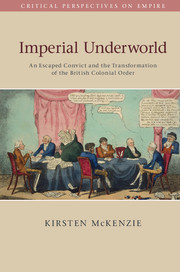Book contents
- Frontmatter
- Contents
- List of illustrations and map
- Cast of main characters
- Acknowledgements
- Map
- Introduction: ‘A soul reared in the lap of liberty’
- 1 ‘Plausible and audacious frauds’: The theatre of imperial politics and reform
- 2 ‘A Daemon behind the Curtain’: Reputation, parliamentary politics and political spin
- 3 Green-bag-makers and blood-hunters: Information management and espionage
- 4 ‘In return for services rendered’: Liberated Africans or prize(d) slaves?
- 5 ‘The dishonorable Court of Gothamites’: Corrupting abolition
- 6 ‘Under the cloak of liberty’: Seditious libel, state security and the rights of ‘free-born Englishmen’
- 7 ‘Unruly subjects’: Political removal and the problem of colonial constitutions
- 8 ‘A conspiracy of the darkest and foulest nature’: The placard affair
- 9 Bring up the body: The many escapes of ‘Alexander Edwards’
- Epilogue: An infamous end
- Bibliography
- Index
4 - ‘In return for services rendered’: Liberated Africans or prize(d) slaves?
Published online by Cambridge University Press: 18 December 2015
- Frontmatter
- Contents
- List of illustrations and map
- Cast of main characters
- Acknowledgements
- Map
- Introduction: ‘A soul reared in the lap of liberty’
- 1 ‘Plausible and audacious frauds’: The theatre of imperial politics and reform
- 2 ‘A Daemon behind the Curtain’: Reputation, parliamentary politics and political spin
- 3 Green-bag-makers and blood-hunters: Information management and espionage
- 4 ‘In return for services rendered’: Liberated Africans or prize(d) slaves?
- 5 ‘The dishonorable Court of Gothamites’: Corrupting abolition
- 6 ‘Under the cloak of liberty’: Seditious libel, state security and the rights of ‘free-born Englishmen’
- 7 ‘Unruly subjects’: Political removal and the problem of colonial constitutions
- 8 ‘A conspiracy of the darkest and foulest nature’: The placard affair
- 9 Bring up the body: The many escapes of ‘Alexander Edwards’
- Epilogue: An infamous end
- Bibliography
- Index
Summary
In 1809, an insignificant French packet ship was intercepted by the English brig Racehorse between the enemy ports of St Denis and Port Louis on the islands now known as La Réunion and Mauritius. Proving herself ill-named, Le Victor was captured as a prize of war and taken to the Cape of Good Hope. In accordance with the necessary legal procedures, Cape Town's Court of Vice-Admiralty ‘pronounced the ship and cargo to be enemy's property at the time of the capture and seizure thereof, and as such, or otherwise, subject and liable to confiscation’. Her ‘tackle apparel and furniture, and the goods, wares and merchandizes laden therein’ were put up for sale, returning the sum of 16 090 rixdollars to be split between the British Crown and the officers and crew of the Racehorse. So far the case of Le Victor was entirely routine. There was nothing in the disposal of the ship and her cargo to suggest that the first step had just been taken on a road that would lead to serious charges of corruption in Cape Town's highest circles and political embarrassment for the British imperial government.
On board Le Victor were four black passengers: Louisa, a woman of twenty-four or twenty-five; her husband, Jean-Pierre, aged about forty-five; a boy of about sixteen named Denis; and a ‘mulatto’ man named Jean-Marie, then aged around seventeen years old, who came to be known at the Cape as Jean Ellé. For those who had seized Le Victor, the status of this group was simply a matter of cold, hard cash. Both the master and the mate of Le Victor told the court that the four were slaves returning to their owners on the Isle de France (Mauritius). Le Victor's master, Claude Guillaume Métairie, described them all as ‘domestics’. Louisa and Jean-Pierre
were the property of Mr. Josset, a captain of a troop at the Isle of France and a French subject… Denis is the property of Monsieur Dubignon, of the Isle of France, likewise a French subject, and Jean Marie is the property of Monsieur Guerin, likewise a French subject, residing at the Isle of France.
Jean (Marie) Ellé would later claim that he was a free man, insistently describing himself as a ‘prisoner of war’ and not a slave.
- Type
- Chapter
- Information
- Imperial UnderworldAn Escaped Convict and the Transformation of the British Colonial Order, pp. 103 - 129Publisher: Cambridge University PressPrint publication year: 2016



